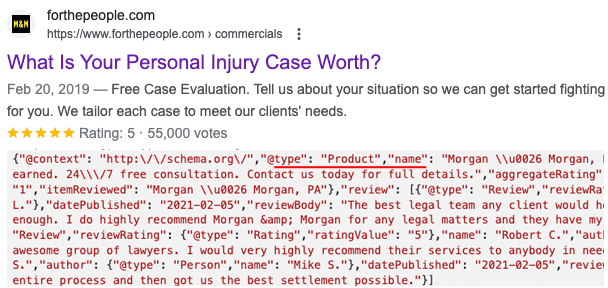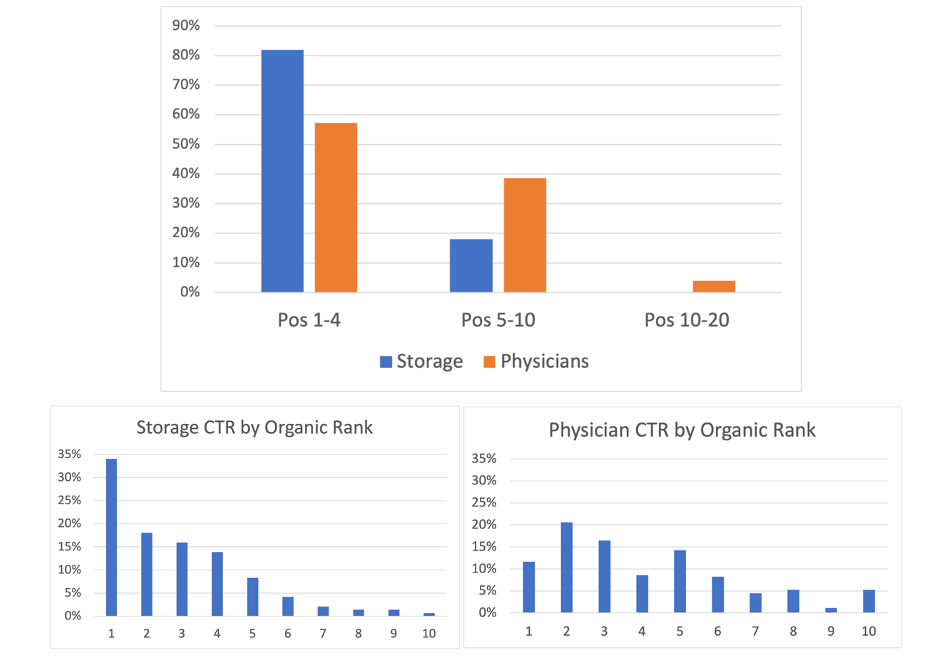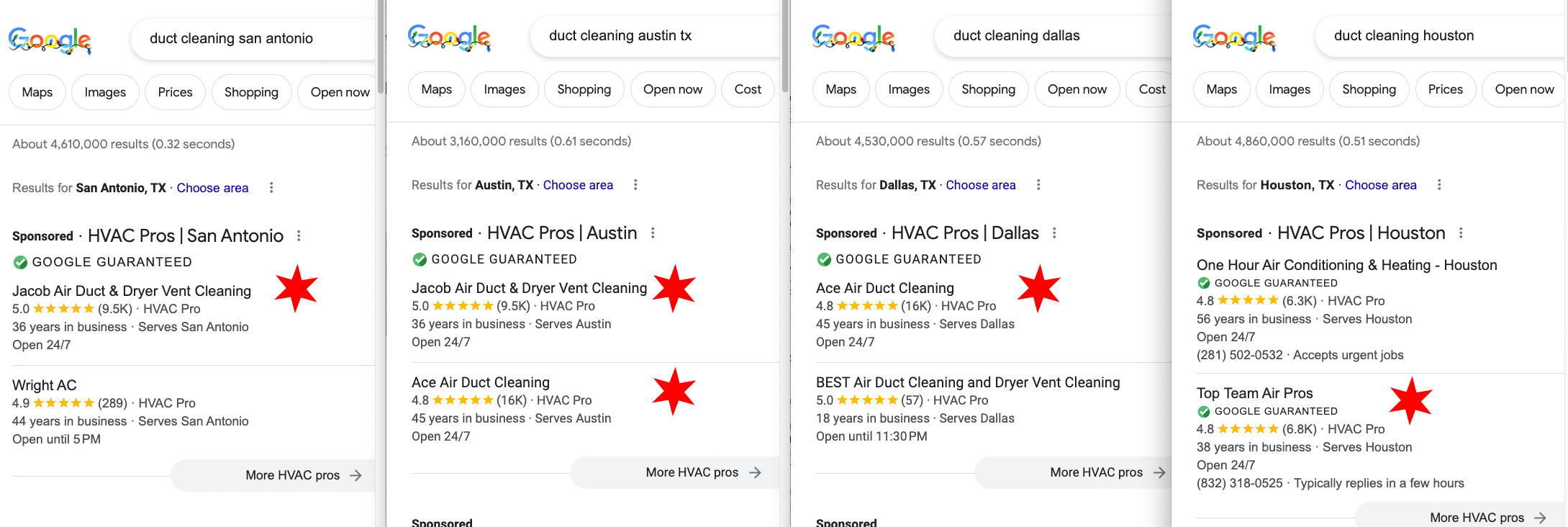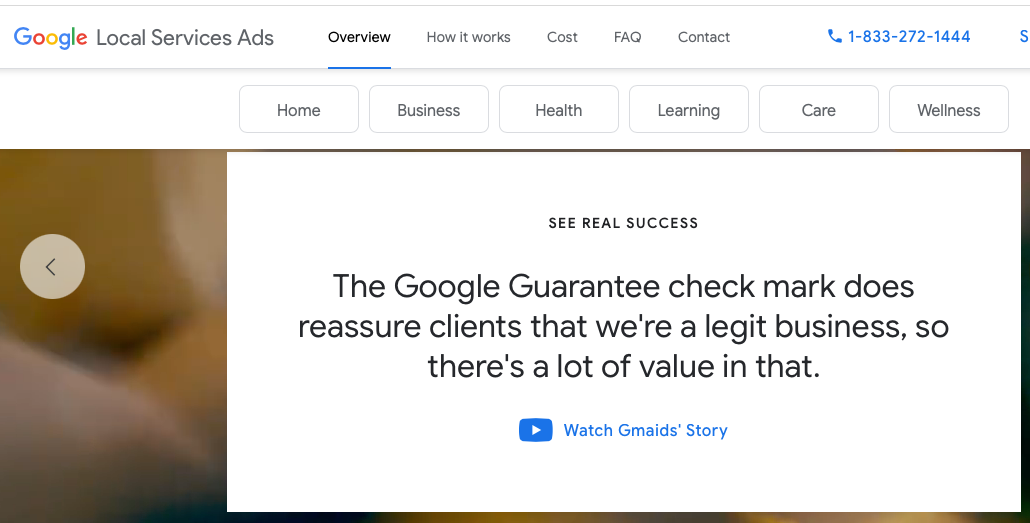Rich Snippet Review Abuse, Organic CTR, LSA Reviewjacking Part 2

Local, Schema Review Abuses

In fall of 2019 Google announced it would be ignoring "self-serving" review markup for local business schema and not show review stars in search results. Google noted there would be no penalties just that stars would not appear in SERPs. Review stars vanished overnight from search results for many businesses. However rich-snippet stars for locations that were part of large multi-location chains quickly reappeared and continue to show to this day. "Enterprising" SEOs wasted no time finding workarounds for smaller businesses, like using product review schema, to get review stars to show even if they did not show on the website (another violation). This tactic is common in the legal space and Google actively ignores violations. Given Google's lack of enforcement, any sane business would explore these workarounds. Why? Near Media research shows that consumers love review stars (more than they actually love reviews) and will go deeper into the SERPs when they see rich snippet review stars. This video from our research panel typifies the behavior of a significant minority of searchers.
In our consumer research, review stars often drive organic choice.
Our take:
- Google has enforced local review schema guidelines very unevenly, favoring large companies over small businesses.
- Businesses willing to circumvent Google's guidelines can get stars in search results and their significant benefits, leaving those who play by the rules at a disadvantage.
- Google is aware of the issue but why haven't they done anything? It's well past time to stop these abuses and enforce the guidelines equitably.
Organic CTR Differences
In SEO 101 we all learned the best place to hide a dead body was on "the second page of Google" results. We also learned that if you weren't in the top 3 results the click through rate (CTR) declined dramatically. But in SEO 301 we learned that when looking at most SEO situations a universal answer is "it depends". That is certainly the case with CTR. Near Media research has found that CTR can vary widely on based category searched, what elements Google adds to the page and user intent. In the case of Storage, a relatively low consideration category, once proximity is resolved price becomes the main consideration for most people. They perceive little difference between ads, local, directories and organic results. There we saw a "classic" CTR distribution. However, in the case of Physicians we saw a dramatically different pattern. These searchers were looking for the "best" doctors and wanted more information, including what they looked like and how high their reviews were. Directories in this category were perceived as largely useless and often avoided. In Storage, 82% of searches were satisfied by one of the top 4 results, compared to only 57% in Physicians. A whopping 43% of Physician searches were satisfied by links below the top 4, and 4% of CTRs occurred below the 10th organic listing.

Our take:
- CTR varies significantly by query and outcome importance. High consideration categories will drive users deeper into the SERP for answers/providers.
- Common wisdom and large data analysis of CTR can only take a business so far in understanding where organic opportunity lies.
- Knowing your vertical and searcher behaviors in that vertical better prepares you for success.
Google LSA Reviewjacking Part 2

Last week, after discovering LSA abuse that allows spam LSA listings to hijack reviews from any Maps listing, I dug in to see how widespread it was and understand its impact. On Monday, Google's Ad Liaison responded on X to these reports and noted they were looking at the issue. Three of the 11 listings discovered are now gone. It appears Google has manually removed some of them but it does not appear that they have applied a systemic fix. This abuse, first spotted in Miami, had been widely seen in Texas. However, with the help of LSA pro Tom Waddington, we were also able to find examples in Southern California, Colorado, Minnesota and Washington State, so we can assume that the issue is national and will require more than a manual action on a few listings. In Texas it was particularly problematic because these deceptive results ranked on the first page of Google in every major market and many secondary markets (see screenshot above). For example, Jacob Air Duct & Dryer Vent Cleaning, now removed, ranked first in San Antonio and Austin, was "borrowing" 9,503 reviews from The Escape Game Austin. They were using Phi Heat & Air's Texas license to get through Google's LSA verification process. Top Team Air Pro with 6,837 reviews from Sunset Cliffs Natural Park in California, ranks second in Houston. A single LSA listing can service a large number of cities; Top Team Air Pro claims to service 17 metro areas in Texas. And "well optimized" listings from a few bad actors can achieve broad geographic exposure. Each of the listings in question has a heavily keyword stuffed name and thousands of reviews "borrowed" from another listing, usually a public park. Both are key ranking factors in LSAs. The ads appear to be mostly lead-gen driven and have used real business licenses (but fake names) to get through LSA vetting. The fingerprint at this stage points to one or two companies previously known for garage door and locksmith spam. Customers are obviously dismayed when the realize they have been duped.

Our take:
- We've seen that LSA positioning and presentation in the SERPS drives attention and action. Ratings play a big role in this behavior.
- The "Google Guarantee" carries an implied promise of a good outcome. By allowing these abuses, Google misleads users and creates an uneven playing field. It reminds me of SEO firms that guarantee ranking first.
- Google loves scale more than security/safety. As they roll out profitable LSAs to more categories, they have allowed Texas-sized scale of abuse, violating searcher trust with a program intended to secure it.

Recent Analysis
- AI uses in Local Agencies: AI & Your Local SEO Agency: One Year Later.
- Near Memo episode 136: How Local SEO Agencies are using Generative AI & ChatGPT: w/ Joy Hawkins & Darren Shaw.
Short Takes
- Webinar Registration: How to Get Your Local SEO Ready for 2024
- Google Search Console for Local: The Best Way to Measure, Track, and Troubleshoot your Local SEO.
- Whiteboard Friday: Link Building for Local Businesses.
- Google expands SGE and tests search by image feature.
- With "store pickup" Uber expands delivery for brick and mortar stores.
- Shouldn't be this hard to remove the Google restaurant reservation button.
- Website Ownership: The Key to Security, Control, & Freedom.
- Google will be rolling out Local Service Ad impression share data.
- Google rolls out major Bard upgrade powered by Gemini.
Listen to our latest podcast.

How can we make this better? Email us with suggestions and recommendations.
